#And fails to provide any credible evidence
Text
Dear God, Westminster was always bad but lately it’s like the Tories have been engaged in a secret contest to see who can come out with the most absolutely rancid takes in the Commons
#I think Miriam Cates has won the last two PMQs on that front she just stands up and spews out the most hateful Daily Mail level lies#And fails to provide any credible evidence#But in the wake of Keir Starmer's unbelievably stupid decision-making over the last week#We've also been subjected to unhinged rants from the Dishonourable Member for North East Somerset (I mean more unhinged than usual)#And numerous other MPs (and members of the Lords) holding forth in a manner that Donald Trump would have thought gauche#The Tories were always gross but half of them seem to have lost touch with reality and to base their speeches off dubious facebook posts#The front bench (packed- you will no doubt remember- with appalling examples like Suella Braverman) look tame by comparison#As if we needed any more evidence that this country has been dragged to the (far) right#We don't even have to look at the Labour party's centre-right approach to certain issues; the Tories are wearing tinfoil hats in parliament#Please please let Miriam Cates be trounced in the next election though dear god she has to go she lowers the IQ of the whole chamber#Praying that the electors of Penistone and Stocksbridge come to their senses and oust her as soon as they can#Michael Fabricant and Lee Anderson are also contenders for that position but they haven't offended me quite so deeply this week
3 notes
·
View notes
Text
Tw// SA
This will be my one and only official statement on this situation, because frankly I’m done with all of this mental hopscotch happening.
I am a sexual assault victim. I was the same age as Caiti is now when it happened, and I was cornered with his hands down my pants touching my vagina and up my shirt touching my boobs, while I tried to get away and make it stop. I still to this day don’t know who my attacker was, but it will follow me for the rest of my life. It’s been five years since then, and my story has not changed once. Not ever. I hadn’t told people for a couple years cause I thought since I didn’t know who my attacker was, I wouldn’t be believed. As well as the fact that I came forward about a sexual harassment I faced at a job and was met with “well, boys will be boys”. Through it all, I am here, and I survived.
Watching the reaction to this situation from both of the main parties involved, those who weren’t there, those who were, and the fans had sent me spiraling. I’ve spent the past two weeks reliving that trauma from five years ago cause I thought I misinterpreted my assault as something else. I had not, and never have. It’s been incredibly invalidating watching the alleged “victim” change the story multiple times, make fake texts, omit important information, all while not even listening to the person she accused of a criminally offensive act.
Caiti is absolutely allowed to feel uncomfortable and regret what happened after the fact, but it is not, and will not ever be assault-unless George actually did touch her boobs, and then that will be a different discussion, but with her credibility disappearing, I’ll only believe it if he admits it himself. I’m trying to extend grace to her being young, sexually inexperienced, and caught up in online culture, but it’s hard the longer this gets dragged out. There are things you do when approaching a situation like this:
1. You absolutely need to provide evidence and proof of your claims. You can’t prove something that never happened, but you can prove something that did. It’s why it’s innocent until proven guilty. Expecting people to blindly believe you is delusional at worst and ignorant at best.
2. You must absolutely have your story 100% correct and factual to how you perceived what happened, before bringing forth any accusations. Using purposefully charged language and then changing the story to match the one you accused is not it. Nor is changing your story yet again when people are catching on to the inconsistencies.
3. Allow the accused person to defend themself. You can’t expect people to listen to all of your claims-most of them blindly doing so-and then get upset when people wait for both sides to say their piece, especially when you present no evidence at your initial statement. Again, you have to prove guilt. If you can’t prove it, the accused are allowed to defend themself.
4. You are in no way obligated to accept apologies, but acknowledging one was made-multiple times in fact- is the bare minimum. Trying to change your story one last time to make it seem even worse than what you both agreed upon, and then hiding behind “I’m not going to address this anymore” is manipulative at worst and cowardly at best.
I hope Caiti gets therapy, cause it’s clear she’s been severely affected by something, though I’m not sure she even knows what it is. I also hope she learns from this, and next time utilizes the “direct message” function every single app has. This could have been a dm, and the way it spiraled has been a shitshow and her intentions are coming off less and less pure the more this gets dragged out. I’m so sorry she was uncomfortable, and regretful, but until she shows any proof whatsoever of any assault happening, it will never be. I hope she heals, and I hope she gets better friends cause they have all failed her.
For George, I’m sorry this got blown so out of proportion and no one even privately talked to him about any uncomfortability being felt. I’m sorry his friends are performative. I’m hopeful that he was made aware of things he wasn’t before, and will do better next time. He is not irredeemable, and I believe growth is possible (the difference in his two responses proves as such). I hope this isn’t the last we see of him or his content, and I hope he can heal from this as well.
To my fellow SA survivors, I’m so incredibly sorry that our trauma has been thrown around like this. Our hurt and pain do not deserve to be mocked in this way, and I wish it would’ve never even happened. You’re stronger than what happened, regardless of how shitty this situation has been for us. And as a 24 year old, I like to consider myself a big sister of sorts, so I love all of you. We got through it then, we’ll do it again.
Speaking woman to woman, I’m sorry this has been so messed up. This will make it harder for us to come forward in the future and that is indescribably frustrating. However, that does not take away from the pain and hurt we went through, and I hope if you do have the strength to come forward, you are believed.
I’m done with this whole situation. It should not have come to this point, and if you stayed this far, I greatly appreciate you reading this. One last time. Caiti, I’m sorry you were so uncomfortable. Get therapy, better friends, and take a break from the internet. George, I hope you learn from this situation, and I’m sorry you were made out to be a criminally offensive person before giving your side or anyone ever speaking to you.
I hope you both heal.
I hope sexual assault victims having to relive trauma, and are affected by this continue to heal.
I love you all.
Lex
106 notes
·
View notes
Text
Ace Attorney 4-4 - Turnabout Succession, Investigation 1
The grand finale to Apollo Justice begins with a surprisingly scrutable case.
Turnabout Serenade did a lot of hinting at Phoenix's secret mission. With the start of Turnabout Succession, it's finally time to find out what he's been doing all this time.

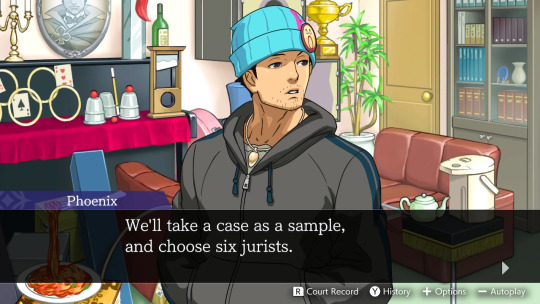

Phoenix has been away working on revamping the entire court system of Ace Attorney. Moving away from the methodology that the franchise has always operated under and reinventing the mechanism by which innocence or guilt is judged.
Stretches credibility that he, a disgraced former attorney who was disbarred for forging evidence, would have the political capital to accomplish something like this. This would make more sense at the height of his career. But with friends like Edgeworth in his corner, it's at least somewhat believable that he might be able to do this.



For the purpose of his demonstration, Phoenix has picked out a nice open-shut murder case for us to lose in court tomorrow. THANKS. But, to make sure we aren't resting on our laurels, our Obviously Guilty client will be receiving a real sentence based on the verdict of this test.

Phoenix is seemingly setting Apollo up to fail, and the cost of that failure will be someone's life. Great. Appreciate that. THANKS.
This is, however, the same man who orchestrated for the killer in 4-1 to be his defense attorney. Papa Beanie Phoenix knows exactly what he's doing, every step of the way. In 4-1, a critical piece of evidence relied on how the court interpreted the amount of poker chips Phoenix had in play. But this time, he really is going all in. This one's for every chip on the table.
So. Let's talk about the facts of the case Phoenix seemingly set us up to lose.
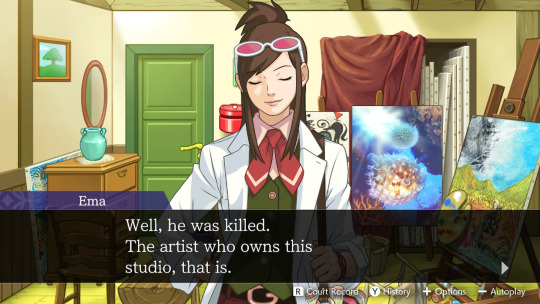


...I mean. Two out of three poisoners in this franchise were men, Ema. And the third also used a knife and a live wire to kill people too. So. Maybe cool it with the Women Be Poisoning.
I don't have any numbers on what the most common methods of murder in Japan are. Ema might be right here. But the idea that women favor poison above all other methods is common in pop culture, as it plays into the idea that women are weaker and need more insidious advantages to have a chance against powerful men.
I can say that in the U.S., according to the FBI's homicide reports, women are statistically far more likely to shoot someone with a gun or stab them with a knife than to poison. Though the number of male killers outnumbers female killers by an order of magnitude, the proportions for what weapons women use maps pretty closely onto the proportions for men.
Getting stabbed still sucks even if it was a woman who stabbed you. A knife is no less sharp in a woman's hands. But maybe it's different in Japan, IDK. Different cultural values and gender norms.
Ema's unnecessary sexism aside, she provides us with our initial understanding of the case at hand.

Drew Misham was a reclusive hermit. He lived here in this studio and didn't leave the house for anything - Communicating with the outside world solely by paper mail as he carried out his... um... particular line of work.

No, not that one.

There it is. Harkening back to our brief stint as a mob lawyer, Drew Misham was is another victim whose dangerous line of work seems to have caught up with him. Drew's been running a successful and lucrative business doing forgeries for a long time now.

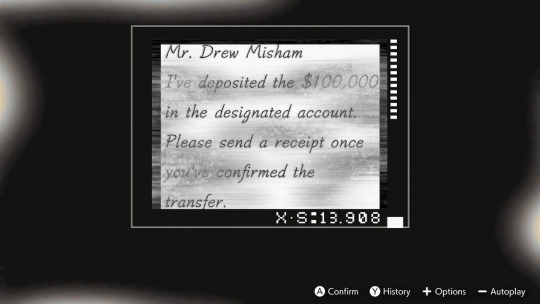

So the obvious conclusion to draw would be that his line of work finally caught up to him. The same thing that happened to Dr. Malpractice. At least, that's one explanation, but the facts of the case paint a much simpler picture.

This is what Phoenix was talking about when he said this was an open-shut case with an obviously guilty defendant. Drew lived in this enclosed space with his daughter Vera. No one else in the entire world had access to him, except by mail. One day he dropped dead. Not a wide list of suspects for that, is there?
So, obviously, she poisoned his coffee. Open-shut case. If two people are in a situation together and then one dies of a gunshot and the other owns a gun then it's not hard to piece together what happened there. Who else in the entire universe could have killed him?
Well, except for the lack of poison in the coffee. That's a bit glaring.
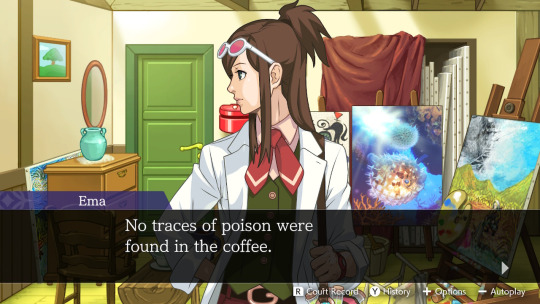
It's kind of hard to poison someone's drink without leaving any poison in the drink. This is, of course, such a gigantic oversight for the prosecution to make that it can't possibly be that simple, right?





Yeah. No. Vera's not getting off that easy. Though the coffee is inexplicably clean, there's still clear traces of poison on that cup all the same. There is no doubt that this is the murder weapon.
Well, that or whatever was in this teeny tiny little frame.

It's surprising how on-the-nose this little frame is. It's called out with a bright neon glow. There's deadly atroquinine in that there picture frame. As clues go, this is obviously meaningful in an obvious way - Well, if you can figure out what was in the frame, anyway. My first time through, my dumb ass was sitting here like, "...a very small photo? Why?"
Nonetheless, what's interesting here is that this mystery is... surprisingly straightforward, in a sense. But the pieces are there. Eagle-eyed mystery solvers may already have pieced together what happened to Drew Misham.
There's enough evidence here at the scene of the crime to make a deduction for how Drew ended up poisoned in an enclosed space with only his daughter for company. There isn't enough to prove it or who did it or why, but the puzzle pieces for what happened are here and can be assembled.
It's a stark difference from 4-2 and 4-3, which take a lot of effort to assemble a basic picture of what the case looks like. As is often the case with grand finales, there are going to be a lot of moving parts here. But for the question of what killed Drew Misham, the answer is right here in plain sight for players to find.
Drew's art studio is the only physical location to inspect for this investigation. Again: Fairly open-shut. One location, clear evidence, obvious culprit, Guilty. As long as we're resigned to lose, Vera can be in and out of the courtroom in five minutes.
Moving on ahead, let's talk about the participants in this case's events.
5 notes
·
View notes
Text
The “missing” witness long-touted by Republicans in Congress as the missing link to their probe into alleged Biden family corruption was accused of being an unregistered foreign agent for China and an international arms trafficker while violating U.S. sanctions on Iran and lying to investigators, among a laundry list of other federal charges unsealed Monday.
Dual U.S.-Israeli citizen Gal Luft was originally charged on Nov. 1, 2022 and arrested in February, according to a statement from the U.S. Attorney’s Office in the Southern District of New York.
Luft had already skipped out on his bail while in Cyprus awaiting extradition to the U.S. for the case in March—though he alleges that the sprawling case against him represents political persecution and retaliation by the Biden administration against a potential witness.
The House Oversight Committee has for months touted a secret “informant” who could provide evidence of an alleged “quid pro quo” deal for foreign aid between an Obama-era Biden and an unnamed country—though details of the arrangement remain murky and unverified at best.
Those claims partially unraveled when Rep. James Comer (R-KY) in May held a much-hyped press conference in which he promised to expose the preliminary findings of four months’ worth of scrutiny into the Biden family’s business dealings—while failing to air any real evidence of corruption. He then offered a partial excuse for the failure: their star witness had up and disappeared.
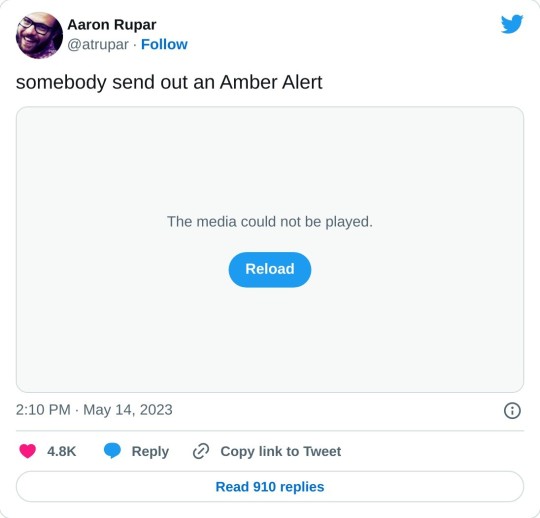
The situation was memorialized in a much-publicized Fox News interview, in which a credulous Maria Bartiromo appeared shocked by the revelations.
“Well, unfortunately, we can’t track down the informant,” the Kentucky representative said. “We’re hopeful that the informant is still there. The whistleblower knows the informant. The whistleblower is very credible.”
“We’re hopeful that we can find the informant,” Comer added. “Remember, these informants are kind of in the spy business, so they don’t make a habit of being seen a lot or being high-profile or anything like that.”
Luft then came forward days later in an interview with New York Post opinion columnist Miranda Devine, alleging that he was hiding out in an undisclosed location after being arrested on charges including international arms dealing, as well as a violation of the Foreign Agents Registration Act, among other charges.
“The chances of me getting a fair trial in Washington are virtually zero,” he told Devine as the reason he skipped out on his bail. “I had to do what I had to do.”
Despite the allegations, Comer doubled down on Friday, tweeting that Luft is a “very credible witness on Biden family corruption,” who “provided incriminating evidence to six officials from the FBI and the DOJ in a meeting in Brussels in March 2019.”
“We have no reason to believe the FBI & DOJ acted on this info,” he continued.
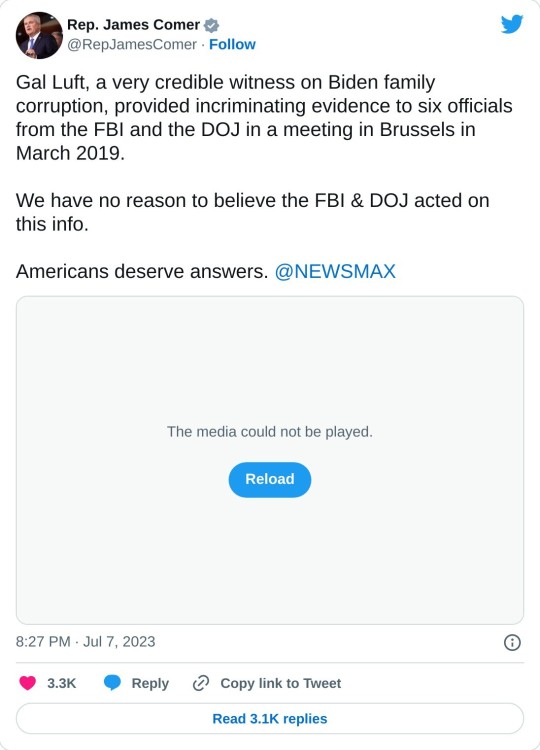
On Sunday, Republican Senator Ron Johnson (WI) added Luft should be granted immunity.
“Now, he’s literally fleeing for his life right now,” Johnson told Fox News’ Maria Bartiromo. “He’s on the run. He’s an important witness. He needs to be granted immunity to be able to testify and tell his story.”
Monday’s unsealed charges add some clarity to the laundry list of alleged crimes Luft is accused of—including a 2016 scheme to “recruit and pay” a White House adviser to support China-friendly policies without first filing as a foreign agent.
According to a release from the Justice Department, Luft is also accused of brokering arms deals with Chinese businesses to sell their wares in places such as the United Arab Emirates, Kenya and Libya—all without a valid U.S. license. Federal authorities allege that they have proof Luft hawked anti-tank launchers, grenade launchers, mortar rounds, aerial bombs, rockets and even drones.
To make matters worse, Justice Department prosecutors say he lied to them during interviews about the alleged scheme.
“During a voluntary interview with U.S. law enforcement in which he was asked questions about his involvement in arms trafficking, LUFT made multiple false statements, including that he had not sought to engage in or profit from arms deals,” the department’s statement reads.
Luft is also accused of brokering deals for Iranian oil—which he falsely labeled “Brazilian”—in violation of U.S. sanctions.
In all, Luft faces 36 counts that carry a maximum of 100 years in prison, according to the Justice Department.
#us politics#news#republicans#conservatives#president joe biden#biden administration#the daily beast#2023#unregistered foreign agent#foreign spy#china#international arms trafficker#arms dealer#Iran#Gal Luft#sdny#rep. james comer#House Oversight Committee#Maria Bartiromo#fox news network#Miranda Devine#New York Post#Foreign Agents Registration Act#international arms dealing#sen. ron johnson
14 notes
·
View notes
Text
Analysis of: Tucker Carlson's interview with Vladimir Putin in Moscow, Russia (February 6th, 2024)
youtube
In the following text "document" refers to the subtitles of the video.
Summary of the evaluation:
Shows strong pro-Russian bias and lack of neutrality in its narrative framing
Relies on selective use of facts and anecdotal evidence that lacks context
Does not consider alternative perspectives in its analysis
Uses nationalist and emotionally charged rhetoric rather than impartial reasoning
Makes claims without providing clear evidence to support accusations
Downplays Russia's role in escalating tensions and conflicts
Fails to acknowledge the complexity of geopolitical issues and independence of other states
Does not present a clear or actionable plan for resolving conflicts
References history selectively to justify positions rather than provide nuanced analysis
Employs common propaganda techniques that aim to persuade rather than inform
As a result, the credibility and reliability of its claims are compromised and should be viewed skeptically without independent verification from other sources
In summary, the evaluation found the document exhibited strong biases, propaganda techniques, and lacked objective analysis, so its information cannot be reasonably accepted at face value.
Summary of the key points from the document
The interview was conducted with Vladimir Putin, the President of Russia, on February 6, 2024 at around 7:00 pm in the Kremlin building.
The interview focused primarily on the ongoing war in Ukraine - how it started, what is happening currently, and how it might end.
Putin provided a lengthy historical context on Russia and Ukraine dating back to the 9th century to explain the intertwined relationship between the two countries and regions.
NATO's expansion eastward after the Cold War and promises made to not expand NATO were broken, which contributed to rising tensions.
The 2014 coup in Ukraine and takeover of Crimea by Russia were discussed. Putin viewed these actions as responses to threats emerging from Ukraine.
Ongoing conflict in eastern Ukraine since 2014 in Donbas region escalated the situation further.
Putin blamed the West, especially the US, for interfering in Ukraine and backing nationalist forces there. This further complicated the relationship with Russia.
Putin expressed openness to negotiations but said the Ukrainian government under Western control had refused and prohibited any talks with Russia.
The goal of "denazification" in Ukraine, or dismantling nationalist elements, was discussed as one aim of Russia's military operation.
No clear path or timeline was outlined for how and when the conflict might end, as it depends on negotiations between the sides.
Key stakeholders
Vladimir Putin/Russian government: Intended to justify Russia's perspective and actions to international audiences. Provides an opportunity for Putin to shape the narrative.
Ukrainian government: The content directly challenges their claims and narrative around the origins of the conflict. May feel allegations need to be addressed.
Pro-Russia/separatist forces in Ukraine: Could view the content as validation of their cause and rhetoric used.
United States/NATO: Strong criticisms made of past policies and interventions. May feel need to rebut claims that their actions precipitated the conflict.
European allies: Also implicated in some of Russia's grievances. May impact their own strategic perspectives and policies towards Russia/Ukraine.
International media/viewers: Provides insights but heavily one-sided content requires verification and consideration of other viewpoints. Could influence their own views depending on their existing leaning.
Domestic Russian audience: Helps rally domestic support by sharing Putin's contextual justification behind military action in friendly terms. Validates government position.
Overall, key stakeholders that may be negatively impacted include those opposing Russia's position, while stakeholders aligning with Russia's stance may view it positively, though full verification of claims is not possible. International audiences would need to consider the content skeptically given its propagandistic intent.
Historical claims
Selective evidence: Only references history that supports its narrative, omitting inconvenient facts.
Lacks nuance: Presents a simplistic view that history demonstrates one dominant narrative of cultural/political unity, neglecting complexity.
Contextual flaws: Fails to situate events within full political/economic contexts of the time that challenge its interpretation.
Linear perspective: Implies a singular linear heritage despite periods where territories had different administrations and fluid national identities.
Unverifiable anecdotes: Uses individual stories but without caveats about anecdotes not being representative historical facts.
Propagandistic tone: Emphasis seems to use history more to legitimize current policies than foster informed, impartial understanding.
Overall, while some facts are referenced, the strategic cherry-picking, lack of qualifying context and propagandistic framing undermine the claims as a reliable, well-rounded historical analysis. Independent verification of dubious assertions and consideration of alternative interpretations would strengthen the analysis. A more impartial accounting of complexities, rather than selectively mining the past, is needed for reconciliation.
The ongoing war in Ukraine
One-sided: Provides only the Russian justification/reasoning for military action without acknowledging complexity or opposing views.
Propagandistic: Frames events and policy decisions selectively to shape public opinion in Russia's favor rather than objective analysis.
Downplays escalation: Minimizes Russia's role in ratcheting up tensions/fomenting conflict while emphasizing others' culpability.
Questions remain: Many assertions regarding intent/motivations cannot be independently verified and require third party corroboration.
Context needed: Standalone soundbites may mislead without considering broader geopolitical/historical factors at play on all sides.
Resolution details lacking: Fails to outline realistic measures to de-escalate/resolve actual combat and humanitarian situation for political settlement.
Biased perspective: Heavily subjective lens through Russian interests means data should not be accepted at face value without scrutiny/balancing with other sources.
In conclusion, while containing some factual data points, the propagandistic and strategically framed nature of much of the content means it provides limited reliable insight for objectively understanding complex realities on the ground or paths toward resolution when considered alone without verification and counterbalancing with alternate perspectives. Independent corroboration of claims would strengthen its informational value in relation to ongoing events. A more constructive approach balancing practical solutions with grand rhetoric appealing to past grievances could aid progress toward peace.
The intertwined relationship between Russia and Ukraine/related regions
Emphasizes shared history: Highlights linguistic, cultural, religious and economic ties developed over centuries to argue close bonds that persist.
Underscores complex interdependence: Acknowledges populations with mixed identity and that separation of interests cannot be simplistically reduced.
Risks essentializing identity: Framing cultural commonality primarily in ethnic/national terms risks overlooking internal diversity and fluidity of individual/group affinities over time.
Downplays compromising of sovereignty: Minimizes periods where territories shifted control between states in ways contradicting narrative of singular linear heritage.
Strategically wields interdependence: Selectively highlights interdependence for justification of policies while diminishing valid aspirations of populations within states for self-determination.
Risks inciting division: Hyper-nationalist rhetoric appealing to historical/ethnic affinities can encourage split loyalties counter to long-term reconciliation and cooperation.
Overall, while cognizant of factual interconnectedness, the subjective lens and selective contextualization undermine ability to constructively address autonomy/security interests of all populations in the region through cooperation instead of competition based on dated notions of control. A less politicized approach could strengthen prosperity for all.
NATO's expansion eastward
Emphasizes perceived promises broken: Puts focus on claims made to Russian leadership prior to expansion that seem to have fueled greater strategic mistrust over time.
Risks oversimplifying negotiations: Complex multilateral talks around expansion involved many trade-offs and perspectives beyond a single broken Russian pledge.
Associates expansion with provocation: Portrays expansions primarily as aggressive instead of considering them part of shifting countries’ autonomous security calculations and democratic processes over time.
Fails to address Russia's declining relative power: Does not acknowledge NATO expansion also coincided with Russia’s diminished standing amid NATO’s new economic successes—a reality challenging original diplomatic assumptions.
Inflames nationalist narratives: Rhetoric emphasizing broken trust and provocations serves more to stoke domestic support than understanding geopolitical contexts beyond a single state view.
Undermines joint security solutions: Recriminations over past actions hinder cooperation needed to mutually resolve tensions that expansion exacerbated between nuclear powers.
Ultimately a more impartial analysis recognizing multiple perspectives and Russia’s own declining economy could strengthen viability of modernized frameworks ensuring stability for all states in the region. But inflamed rhetoric risks further destabilization.
2014 coup in Ukraine
One-sided depiction: Entirely portrays the Maidan protests/change of government as a "coup" backed by the West without acknowledging internal Ukrainian political dynamics.
Simplifies complex situation: Reduces multi-faceted events to a simplistic narrative of foreign interference while minimizing domestic unrest with the existing government.
Undermines Ukrainian agency: Fails to acknowledge Ukrainian citizens exercised their own autonomous will through valid democratic processes, however imperfect.
Inflammatory language: Terms like "coup" aim more to provoke than objective understanding, fueling greater tensions versus reconciliation.
Interferes with impartial analysis: Biased framing complicates independent scholarly assessment by presupposing conclusions counter to realities on the ground.
Adds to conflict escalation cycle: Provocative rhetoric serves to justify intensified Russian policies of control rather than diplomacy to stabilize the situation cooperatively.
Overall, the inflammatory and conspiratorial framing reflects strategic propangandizing over impartial truth-seeking and risks entrenching conflict more than understanding it for remedies acceptable to all affected populations in the region.
Conflict in eastern Ukraine's Donbas region since 2014
Downplays Russian role: Minimizes Moscow's provision of arms, funding and other support to separatist militants escalating unrest into full conflict.
Portrays as internal Ukrainian issue: Depicts matter largely as a spontaneous reaction within Ukraine rather than proxy dimension involving regional powers.
Ignores ceasefire violations: Fails to address separatist shelling of Ukrainian military positions undermining negotiated end to hostilities.
Presents biased causality: Blames Ukrainian nationalism for conflict escalation rather than entanglement of external geopolitical machinations.
Hinders diplomacy efforts: Propaganda-tinged framing entrenches inflexible positions complicating efforts at durable political solution among adversaries.
Polarizes communities: Risks cementing deep societal divides within Ukraine through scapegoating rhetoric versus reconciling mutual interests.
Ultimately a more impartial diplomatic approach acknowledging shared responsibilities of all sides for adhering to negotiated accords could stabilize situation, whereas bellicose narratives risk making resolution ever more elusive.
Western interference and support for nationalist forces in Ukraine
Lacks substantive evidence: Makes strong accusations but provides no hard proof beyond conjecture to substantiate claims of deliberate interference or backing.
Over-simplifies complex dynamics: Reduces multifaceted political events and social forces to a single narrative of foreign provocation for strategic objectives.
Ignores Agency of Ukrainians: Fails to acknowledge Ukrainians have their own aspirations and agency, reducing their actions entirely to external manipulation.
Propagandistic framing: Using such loaded terms as "interference" aims more to assign blame than impartial analysis, fueling further geopolitical divide.
Undermines diplomacy: Inflexible stances based on unverified claims rather than cooperation poison relations needed to resolve tensions.
Risks entrenching conflict: Inflammatory rhetoric serves political agendas more than reconciliation by polarizing communities and cementing "us vs them" mentalities.
For an accurate understanding, verifiable evidence rather than speculation would be needed to substantiate such grave accusations. Overall, more constructive bilateral diplomacy based on mutual respect seems needed to reduce tensions versus contested nationalist histories.
Openness to negotiations
One-sided portrayal of negotiations: Implicitly frames Russia as open and others as refusing, without acknowledging Russia's own preconditions or role in escalating conflict.
Overlooks legitimacy concerns: Fails to acknowledge Russia's military intervention compromised Ukraine's ability to freely determine its negotiating partners and priorities.
Ignores sovereignty issues: Downplays how negotiations involving annexation of territory damage Ukraine's sovereignty and constrain its autonomy.
Reduces complexity: Simplifies challenges as unilateral refusal rather than recognition of good-faith differences in priorities and pressures each side faces.
Propagandistic language: Terms like "Western control" aim more to assign blame than impartial understanding of domestic political realities in Ukraine.
Risks hindering diplomacy: Inflexible stances based on contested claims likely poison the trust needed to make progress via cooperation.
Overall a more balanced and less accusatory perspective acknowledging the multifaceted challenges for all sides could better support constructing diplomatic solutions than divisive rhetoric that risks further entrenching conflicting positions.
Claims about "denazification" in Ukraine
Lacks evidence: No proof is provided that Ukraine's government is actually controlled by neo-Nazis rather than populists.
Reductive argument: Labeling opponents as Nazis downplays Ukraine's own complex nationalist narratives and marginalizes non-extremist concerns.
Echoes propaganda tropes: Uncritically uses terms common in Russian propaganda narratives meant to de-legitimize Ukrainian sovereignty claims.
Ignores nuance: Fails to acknowledge nationalist sentiments exist across many post-Soviet states and do not equate support for extremism.
Potential pretext for control: Could serve to justify open-ended Russian interference by setting impossible standards of "purity" no society fulfills.
Exacerbates tensions: Provocative and stigmatizing discourse damages reconciliation by casting political opponents as ultimate enemies.
Overall, applying explosive labels without evidence risks ratcheting up conflict more than resolution. Diplomacy requires acknowledging diversity of perspectives across interconnected societies in an even-handed manner respectful of all.
The document does not provide a clear path or timeline for how and when the conflict might end.
Some key evaluations:
Lacks specifics: No concrete diplomatic proposals, ceasefire terms, peacekeeping arrangements, political settlement details are outlined.
Vague on resolution: Goals of "de-Nazification" and protecting Russian speakers are nebulous with no roadmap for verifiably implementing and concluding them.
Unilateral focus: Emphasis remains on justifying Russian positions rather than outlining mutually agreeable compromises all sides could accept.
Omits compromise: Fails to acknowledge peaceful resolution requires good faith concessions rather than unilateral enforcement of preferred outcomes.
Propaganda over pragmatism: Rhetoric prioritizes blame over practical cooperation needed to stabilize violence and uplift humanitarian crisis.
Risks prolonging conflict: Absence of a negotiated ‘end state’ vision sustains ambiguity fueling continued escalation by attrition over years.
Overall, the document provides a justification for conflict rather than the inclusive diplomacy essential for its verifiable resolution. Specific proposals balancing interests of all affected communities would better support a durable political settlement and lasting peace.
Quality of reason
Logical Consistency: While some points are logically put, selective evidence and logical fallacies undermine internal consistency.
Use of Evidence: Some facts are cited but heavily skewed interpretation. Questionable anecdotes presented without qualification undermine evidential quality.
Impartiality: Highly partial framing fails tests of neutral principle and omits consideration of counter perspectives.
Objectivity: Subjective lens is not balanced with acknowledging room for alternate views in analyzing multifaceted problems.
Avoidance of Prejudice: Nationalist rhetoric & victim-blaming falls short of impartiality needed for sound understanding across cultural divides.
Clarity: At times difficult to separate statements of fact from interpretations without independent verification due to blending.
Proportion: Overemphasis of some details distorts overall perspective; disproportionate time spent on pet issues vs balanced treatment.
Overall, while containing sporadic well-reasoned points, the pervasive biases, fallacious arguments, skewed use of evidence and lack of impartiality compromise a prudent, well-reasoned analysis. Claims require verification and should not be accepted at face value due to departures from standards of sound rational judgment in evaluating complex, multifaceted problems. Alternative viewpoints would aid critical examination.
Logical fallacies
Cherry picking/selective evidence - Only presents evidence that supports Russia's narrative while omitting alternative perspectives and facts that do not fit its position.
Appeal to history/tradition - Justifies Russia's claims by presenting selective usage of long history between Russia and Ukraine while glossing over periods counter to its stance.
Strawman - At times implies opponents believe certain extreme claims like inevitability of conflict when actual positions are likely more nuanced.
Blaming the victim - Presents Ukraine's actions after 2014 coup as provocative while minimizing Russia's own role in escalating tensions.
Whataboutism - Deflects from discussion of its own positions by pointing fingers at flaws of other countries instead of addressing the issue directly.
Conspiracy theory - Implies US/NATO desire for conflict is due to entrenched interests rather than geopolitical disagreements, without substantive evidence.
Anecdotal evidence - Supports some claims with unverifiable stories presented as factual rather than illustrative.
Overall, while containing factual information, the document undermines its own credibility through the extensive use of biased reasoning, selective framing of history and deflection tactics - suggesting the overall narrative is propagandistic rather than a good faith analysis of complex geopolitical issues. Independent verification of questionable claims would be needed.
Bias
Strong Pro-Russian Government Bias: The narrative and framing of issues is constructed entirely from Putin's perspective without acknowledging alternative views.
Lack of Neutrality: No attempt is made to present a balanced, objective analysis. The explicit aim appears to justify Russia's actions rather than explore complex geopolitical issues impartially.
Selective Omission of Facts: Important context like the full history of Russian-Ukrainian relations and Russia's role in previous escalations are omitted or downplayed.
Exclusive Reliance on Anecdotal Evidence: Unverifiable stories are presented without caveats alongside real facts/events, obscuring what's factual.
Appeals to Emotion: Nationalist rhetoric, victim-blaming other parties aims to elicit emotional agreement with Russia's view rather than reasoned analysis.
Propaganda Techniques: Common tactics like misrepresentation, distractions and cultivated confusion compromise the credibility and verifiability of claims.
Lack of Transparency: Readers are not actively informed of the high level of bias shaping the content and prevented from considering alternative perspectives.
In conclusion, the heavy ideological leaning and propagandistic approach mean the document cannot reasonably be considered an objective analysis and should be treated skeptically rather than taken at face value due to the pervasive biases compromising its reliability and Trustworthiness as a factual account. Independent verification of claims would be needed.
Based on the content and tone of the document, Putin's position comes across as more autocratic than democratic:
Unilateralism: Decisions around Ukraine are portrayed as responses to threats rather than through consultation/compromise.
Top-down narratives: Public understanding is shaped through one-sided messaging rather than open debate of diverse views.
Propaganda techniques: Appeals to emotion, misdirection and confusion undermine standards of transparency/informed consent.
Deflection of responsibility: Focus is on others' actions rather than constructive solutions or acknowledgment of all sides' contributions.
Power centralized: No acknowledgement of other Russian political voices or dissenting domestic public opinion on policies.
Ideological direction: Strategic aims framed by inflexible notions of sovereignty/tradition rather than mutual understanding.
Limited accountability: Public positions subject to little oversight/correction from independent institutions or population.
Victimized identity: Depiction of Russia as acting in defense rather than partnership suggests diminished civil norms.
While democratic values like open debate/transparency are paid lip service, the substance, framing and control of public discourse suggest more autocratic tendencies in how policy issues are addressed and public perspectives are shaped on the international stage.
Rhetorical propaganda devices
Whataboutism: Deflects criticisms of Russia by accusing others of similar or worse actions.
Selective omission: Leaves out important historical/contextual details that undermine Russia's narrative.
Loaded language: Uses emotionally charged terms like "coup" and "nationalism" rather than neutral terms.
Slogans over substance: Employs simple talking points rather than engaging opposing viewpoints.
Appeals to emotion: Invokes nationalist pride and victimization to elicit agreement rather than reason.
Black-and-white thinking: Presents a Manichean view dividing everything into opponents and allies of Russia.
Scapegoating: Blames outside forces rather than address Russia's own role in tensions and conflict.
Confusion techniques: Provides rapid fire claims that are difficult to fact check, cultivating doubt.
The heavy reliance on these common propaganda devices aims more to persuade through emotional manipulation rather than inform readers or have an honest debate. It casts doubt on the document's credibility and objectivity.
Putin's personality
Confident: He speaks authoritatively about Russian perspectives and is unwavering in his views.
Nationalistic: He takes pride in Russian history and values cultural/political independence from the West.
Calculated: He provides nuanced perspectives but ultimate goals seem aimed more at justification than impartial problem-solving.
Frustrated: Past broken promises and perceived Western interference are sources of lingering grievances.
Defensive: He portrays Russia as reacting to external threats rather than examining Russia's own escalatory actions.
Selectively empathetic: He shows care for ethnic Russians affected by the conflict but disregards non-Russian Ukrainian suffering.
Conspiratorial: Tendency to see Western aims in geopolitical dynamics in calculated or intentionally provocative ways without evidence.
Pragmatic: Ready to negotiate but only from position of current Russian control in Ukraine gained via military operation.
Experienced: Has observed global events for decades but solutions still embroiled in outdated notions of great power politics.
Overall, while articulating nuanced perspectives, Putin comes across as ideologically hardened in defending Russian stances, erring more on the side of propaganda than impartial examination of conflicts' inherently complex nature.
Common evaluation criteria
Purpose/Goals: To present Putin's perspective on the conflict in Ukraine and his motivations/justifications for Russia's actions. He is able to fully explain his viewpoint.
Tone: Remains generally respectful and informative as expected in an interview format, though Putin appears firm in his views.
Balance: Both sides of issues are discussed but focus is on Putin providing context for Russia's actions. Interviewer occasionally challenges some assertions.
Factual Accuracy: Varies - some historical contexts and quotes check out but some claims around motivations of others involved are difficult to independently verify.
Perspective/Bias: Content is strongly from Putin's point of view without alternative perspectives included. Not surprising given the format but does not present a balanced analysis.
Flow/Organization: Answers are generally well-explained and on topic in response to questions. Occasional tangents into historical minutiae but overall coherent narrative.
Tone & Delivery: Putin comes across as confident and in control of the dialogue. Frustrations with past actions of others also come through at points.
Overall based on these criteria, the document accomplishes its goal of presenting Putin's perspective on the conflict in Ukraine through an in-depth interview format. However, the heavy focus on his point of view and lack of challenges to some claims mean the content cannot be considered a neutral or fully fact-checked analysis.
#UkraineConflict#UkraineInvasion#RussiaUkraineWar#NATO#Putin#RussianPolitics#UkrainianIndependence#UkrainianSovereignty#CrimeanAnnexation#DonbasWar#Luhansk#Donetsk#Propaganda#Disinformation#StateMedia#Ukrainiangovernment#UkraineArmedForces#RussiaNATOrelations#NATOEnlargement#RussianSecurityConcerns#UkrainianNationalism#UkrainianIdentity#UkrainianLanguage#MinskAgreements#Ceasefire#PeaceTalks#WesternSanctions#RussianSanctions#EconomicWarfare#WestvsRussia
3 notes
·
View notes
Text
The man, the myth, the legend, who inspired some of my takes for Tobias' rapid rise to opulence:
"During the early stages of World War II, Pujol decided that he must make a contribution "for the good of humanity" by helping Britain, which was at the time Germany's only adversary. He approached the British Embassy in Madrid three different times, but they showed no interest in employing him as a spy. Therefore, he resolved to establish himself as a German agent before approaching the British again to offer his services as a double-agent.
Pujol created an identity as a fanatically pro-Nazi Spanish government official who could travel to London on official business; he also obtained a fake Spanish diplomatic passport by fooling a printer into thinking Pujol worked for the Spanish embassy in Lisbon. His instructions were to move to Britain and recruit a network of British agents. He moved instead to Lisbon; – using a tourist's guide to Britain, reference books and magazines from the Lisbon Public Library, and newsreel reports he saw in cinemas – created seemingly credible reports that appeared to come from London. He claimed to be travelling around Britain and submitted his travel expenses based on fares listed in a British railway guide.
During this time he created an extensive network of fictitious sub-agents living in different parts of Britain. His reports were intercepted by the British Ultra communications interceptions programme, and seemed so credible that the British counter-intelligence service MI5 launched a full-scale spy hunt. The British had become aware that someone had been misinforming the Germans, and realised the value of this after the Kriegsmarine wasted resources attempting to hunt down a non-existent convoy reported to them by Pujol.
Pujol wrote 315 letters, averaging 2,000 words, addressed to a post-office box in Lisbon supplied by the Germans. His fictitious spy network was so efficient and verbose that his German handlers were overwhelmed and made no further attempts to recruit any additional spies in the UK. The information supplied to German intelligence was a mixture of complete fiction, genuine information of little military value, and valuable military intelligence artificially delayed.
For radio communication, he needed the strongest hand encryption the Germans had. The Germans provided him with this system, which was in turn supplied to the codebreakers at Bletchley Park. His encrypted messages were to be received in Madrid, manually decrypted, and re-encrypted with an Enigma machine for retransmission to Berlin. Having both the original text and the Enigma-encoded intercept of it, the codebreakers had the best possible source material.
On occasion, he had to invent reasons why his agents had failed to report easily available information that the Germans would eventually know about. For example, he reported that his (fabricated) Liverpool agent had fallen ill just before a major fleet movement from that port, and so was unable to report the event. To support this story, the agent eventually "died" and an obituary was placed in the local newspaper as further evidence to convince the Germans. The Germans were also persuaded to pay a pension to the agent's (also fabricated) widow. The Germans paid Pujol US$340,000 over the course of the war to support his network of agents, which at one point totaled 27 fabricated characters."
#muse: tobias.#* tobias. / development.#ask to tag#This man was such an icon I can't even UADUISADHSAD8AIDU#Tobias 1000% did something similar except on a much larger scale (not just 2 countries; and not only in the military dept)#The sheer amount of aliases Tobias has by the time he turns 21 almost rivals L's own 😭😭😭#If one day Wammy's decides to hunt him down it'd be such a hilarious experience bc they'd realize he's intrinsically tied to EVERY#field you can possibly think of; and has allies that'd stop any investigation on his behalf thru any means necessary w/o him asking them to#Some of these connections are genuine; some are completely fabricated like above ^; some are thru blackmail; some are thru other allies etc#'Which country is he loyal to?' None; next question! ADHSAUIDSJASDK in theory it should be the UK bc of his upbringing but#precisely BECAUSE of his upbringing it isn't the UK. His only allegiance is to Wammy's House and even that is... dependent on the context#I mean he accomplishes his role as a 'safeguard of peace' as per Wammy's wishes/goals; but he has Such a chaotic way of doing so...#He considered the US for a bit too but the vice president cheering on Kira irritated him enough that he dismissed that idea
2 notes
·
View notes
Text
It's embarrassing to Putin that US intelligence is better than his own secret police at assessing the threat posed by ISIS inside Russia. And it's irresponsible of Putin not to have taken the US advisory seriously.
The US warned Moscow that ISIS militants were determined to target Russia in the days before assailants stormed the Crocus City Hall in an attack that killed scores of people, but President Vladimir Putin rejected the advice as “provocative.”
Gunmen stormed the concert hall near Moscow on Friday, opening fire and throwing an incendiary device in the worst terrorist attack on the Russian capital in decades.
Isis has claimed responsibility for the attack.
Experts said the scale of the carnage – some of which was captured in video footage obtained by CNN showing crowds of people cowering behind cushioned seats as gunshots echoed in the vast hall – would be deeply embarrassing for the Russian leader, who had championed a message of national security just a week earlier when winning the country’s stage-managed election.
Not only had Russian intelligence services failed to prevent the attack, they said, but Putin had failed to heed warnings from the United States that extremists were plotting to target Moscow.
Earlier this month, the US embassy in Russia had said it was “monitoring reports that extremists have imminent plans to target large gatherings in Moscow,” including concerts, and it warned US citizens to avoid such places.
US National Security Council spokesperson Adrienne Watson said the US government had “shared this information with Russian authorities in accordance with its longstanding ‘duty to warn’ policy.”
But in a speech Tuesday, Putin had blasted the American warnings as “provocative,” saying “these actions resemble outright blackmail and the intention to intimidate and destabilize our society.”
That stance came despite Russian authorities having reported several ISIS-related incidents within the past month.
Some of us may recall another time when the leader of a large country didn't take warnings of a terror attack seriously.

Of course Putin is trying to blame the attack on Ukraine without providing any credible evidence. But anybody who seriously keeps an eye on terrorists understands that this attack was conducted by an ISIS related group. I mean, ISIS-K itself is openly taking credit for the Crocus City Hall rampage.
Russia and its predecessor the USSR have been angering Sunni Islamic militants for a long time. It doesn't take much for ISIS to get pissed off at you and Russia has been giving them lots of material.
The Soviet invasion of Afghanistan in 1979 set off the forever war in that region.
Russian intervention in Syria where Putin has been propping up fellow dictator Bashar al-Assad since 2015.
Russia's de facto alliance with the Shi'ite régime in Iran has Sunni ISIS enraged; they consider Shi'ites to be heretics.
Russia's growing involvement in Africa puts it at odds with ISIS elements there – especially in the Sahel.
The Putin régime has been stepping up suppression of religions other than Orthodox Christianity in Russia.
Crocus City Hall, site of the shootings and fire, is in Krasnogorsk which is not terribly far from Putin's official suburban residence in Novo-Ogaryovo. In a direct line, the two are about 9 miles/14.4 km apart; that's the distance between downtown Chicago and the nearest suburb Oak Park. According to Google Maps, it's a 25 minute ride.

I bring this up because it was reported...
President of Russian Vladimir Putin conveyed get-well wishes to victims via Deputy Prime Minister Tatiana Golikova. He did not address the nation himself.
When the late Yevgeny Prigozhin was headed to Moscow with his mutineers last year, Putin apparently fled to the Saint Petersburg area. If the most senior official available just after the Crocus attack was a deputy prime minister, that may be an indication that Putin and other senior figures were headed out of town during the crisis.
Just one more observation: Crocus City Hall was the venue for Donald Trump's 2013 Miss Universe contest.
Crocus City Hall: The Trump-linked venue that's now the scene of a deadly IS attack
#isis#isis-khorasan#terrorism#russia#crocus city hall#krasnogorsk#vladimir putin#failed security#putin ignored intelligence warnings#putin's suburban residence#novo-ogaryovo#россия#владимир путин#терроризм#ИГИЛ#красногорск#путин бежит из москвы#ново-огарёво#дезинформация от путина#татьяна голикова#donald trump#miss universe 2013
6 notes
·
View notes
Text
Since a certain blog continues to spread misinformation without providing valid proof, here's reasons why an actor's social media presence matters towards the casting decision:
They check to see if your actor package is coherent on all social media platforms
They evaluate the each you have because it leads to potential audience for a project
They evaluate how you interact with people (rude online? Say goodbye to being booked)
They evaluate whether or not the image you pitched them matches your online persona and if it is authentic.
They looks to see if you could be a potential production risk ( if your sm is full of pictures of you drunk that might mean you are unreliable on set and might cause issues)
They check to see if you are a professional( you'd be surprised how many supposed actor treat their sm accounts as if they were personal accounts instead of employing them as a marketing tool)
They check to see if you stay informed when it comes to your own craft
They check to see if there are any potential PR issues that might rise from choosing you
They check to see if the image they need you for is in any big way contradicted by what you post and do. (If you want to get hired by Disney but your profile is all edgy and dark then the casting director loses credibility if they are to propose you so they just avoid doing that due to the image conflict - your essence does not match the role, clearly)
They check to see if you promote others and if so how you do that ( if you respect NDAs, etc)
In some cases, they might even do some social listening or market research to determine what the fan reaction is to you.
They look to confirm who you are and what you are about so if your tagline is about telling deep stories but your online presence is vapid and self centered then you will go into the No pile fast because you are not delivering your brand promise.
They looks for pictures or video evidence of the skills you stated on your resume (karate? Horseback riding? Where's the evidence you actually are good at that?)
Goes without saying but first thing they look for is more evidence of your acting skills, do you have character clips posted and named appropriately? Are they easy to find?
I am going to stop here but my point is it is all done to ensure you can be entrusted with the project/role and that your image lines up with their goals for said project.
Feel free to research these, by the way, don't just take them for granted. A lot of misconceptions in fandom stem from people refusing to do research. Like it or not, an actor's package determines whether or not they end up in the Yes pile and SM is very much a part of that package. An online presence for an actor should be their perfect elevator pitch, it's a chance to show all the skills and qualities that make them a bullseye for certain roles and actor who are all over the place and fail to do that have far less chances to be considered professional. If you are not professional and lack industry know how and craft why would someone hire you over a candidate that is your exact opposite?
7 notes
·
View notes
Text

Steve Brodner :: What's a Military for, Anywayzz??
* * * *
[THE REPUBLICAN ROAD TO CRAZYTOWN]
Wednesday was one of the wildest days on Capitol Hill, as FBI Director Chris Wray faced a conspiracy-addled House Judiciary Committee in a hearing that really did go “off the rails.”
Can you make sense of this:
Chair Jordan appeared on Fox News’s Hannity after the FBI oversight hearing that went off of the rails, where he said:
“A federal judge disagreed with what Christopher Wray testified to today and he did that decision on July 4th just eight days ago for goodness sake that's exactly what happened with uh with the decision the the uh when it came to the uh the the decision with um uh I drew a blank there so I apologize I got a huge echo in my ear and I can't I can't even hear.
“But but yeah that's exactly what what happened they uh they pre-bunked this story and Facebook specifically asked the FBI is the Hunter Biden story Russia misinformation and the FBI said no comment this is after they had the laptop for an entire year after they've been telling all the big tech companies get ready for a hack and dump operation it's coming and it's going to involve Hunter Biden and then it happens and they get that fundamental question no comment and this is from the foreign influence task force director the lead on that that foreign influence task force that Christopher Wray created.”
Can anyone who isn’t an avid viewer of Faux Snooze or a consumer of other conservative media understand what Jungle Gym was talking about?
Jordan speaks almost entirely now in the language of conspiracy theories; only the “extremely online” members of MAGA can make sense of the word salad that was tossed around.
The hearing, and Jordan’s appearance on Hannity, demonstrate that there is a bigger issue here:
The Republican Party is now running on insanity.
Jordan is pushing the issue of “FBI censorship” to legitimize the Hunter Biden laptop - which was mentioned so many times that Eric Swallwell used his five minutes to wonder if the GOP had another subject. According to witnesses, the Biden laptop has had its data manipulated so that Russian misinformation could be inserted into it. But all the tracks the GOP Crazy Train rolls on lead here, because the lies and falsehoods created and told by MAGA about Hunter Biden is the centerpiece of Trump’s 2024 campaign.
While the MAGA Republicans have spent nearly four years attempting so far unsuccessfully to legitimize The Hunter Biden Laptop and get their fantasies into corporate media, all the non-conservative media that have investigated the laptop have found the tale dubious and not credible.
Jordan and the rest of MAGA know they are running out of time. The 2024 campaign season begins this fall, and Congress always has an even shorter schedule than normally during election years. If Jordan and his co-conspirators can’t make anything stick to Joe Biden before January, their mission to restore Trump to the White House will have failed.
This is why hillbilly moron James Comer (R-Klueless) is now depending on fugitive Chinese spies to provide evidence against President Biden. The fact he does so is proof of their desperation born of their continuing failure to slime the president since taking control of the House this year.
Trump’s lies about having the 2020 election stolen from him has accelerated the slow decline of conservatism within the Republican Party over the past 40 years since the arrival of what became the Gingrich Revolution. Trump’s insanity has now turned the collective crazy of the Republican “kook’ fringe into the GOP’s DNA.
That we have one of our two political parties in such a collective psychosis is a dangerous spot for the nation to be in. The House Republicans know no bill on any topic that they pass will come out of the Democratic-majority Senate, so what they are passing are “messaging” bills to show the MAGA base that they are “fighting the good fight.” To much of the base, the fact that the antics the MAGA House Republicans are engaging in get a negative response from the Democrats is a plus - their representatives are “owning the libs.”
And so many of the far right “stars” have their own political and financial base, which means the GOP leadership in the House holds little to no sway over them. Thus, when Marjorie Traitor Goon’s amendment to strip all funds for support of Ukraine out of the “must-pass” NDAA was tossed by an overwhelming majority against her pro-Putin nuttiness, she blithely announced to Quiverin’ Qevin that this meant she would be unable to vote in favor of the amended NDAA. McCarthy can only afford to lose three more Republicans before he loses his majority to pass that bill (which will never come back from the Senate with any of the Kulturkampf amendments still in it), since Democrats have announced they will not vote in favor of the bill due to the amendment stripping the Pentagon of the ability to grant leave and travel assistance to service members who require abortion services in another state if they are unlucky enough to be stationed in one of the Republican-run states that have now abolished the right to an abortion in that state.
Regarding the NDAA, the Republicans managed to hang 70 far right amendments on the legislation in voting on Thursday, with every “moderate” “Biden district” “moderate” voting in lockstep with the nutballs the “moderates” claim to dislike.
Democrat Jim McGovern had this to say about today’s votes:
“This process has shown us the priorities of the Republican majority. Protecting the reputation of confederate leaders. Banning books because they want to rewrite history. Controlling women's bodies, overturning Roe vs. Wade wasn't enough. They want to ban abortion nationwide. They want to restrict a service members' ability to get travel expenses covered. Attacking LGBTQ+ service members. Cutting off aid to Ukraine in the middle of their fight against Putin. Stifling diversity and equity in the military. And shrugging off climate change which the Department of Defense says poses a direct threat to our national security. You can't make this stuff up, Mr. Speaker...
“The Speaker of the House needs to grow a spine. Not for his own reputation but the good of his country. This is a terrible, terrible process. These amendments are pathetic that have been made in order. They are offensive. It disrespects and diminishes this institution. It is sad to see this small group of extremists calling the shots here, but that is what is happening right now.
“Let me again remind everybody. In this rule, 70 Republican amendments, six bipartisan amendments, and four Democratic amendments. On what planet is that even considered reasonably fit? This is outrageous. A big chunk of the Democratic amendments, you may not agree with them, but we ought to have 10 minutes of debate and vote up or down. They say that this is about getting woke out of the military. They blocked my amendment to help homeless vets get rides to medical appointments. What the hell is woke about that? They blocked it because it was woke. I don't even know what they are thinking.”
Following the votes on amendments Thursday night, the three top House Democrats - Minority Leader Hakeem Jeffries, Minority Whip Katherine Clark and Democratic Caucus Chair Pete Aguilar - issued a blistering statement outlining their opposition to the revised NDAA bill:
“House Republicans have turned what should be a meaningful investment in our men and women in uniform into an extreme and reckless legislative joyride. The bill undermines a woman’s freedom to seek abortion care, targets the rights of LGBTQ+ servicemembers and bans books that should otherwise be available to military families.”
Adam Smith, top Democrat on the House Armed Services Committee, and other subcommittee ranking members also released their own lengthy statement criticizing the legislation. These Democrats would normally be vocal supporters of any defense-related bill, but they’re not doing that now.
“The bill we passed out of committee sent a clear message to our allies and partners, global competitors, and the American people that democracy still works, and Congress can still function….
“That bill no longer exists. What was once an example of compromise and functioning government has become an ode to bigotry and ignorance.”
What clearly demonstrates where the Krazies are really at is the report that one of them lobbied a Republican “moderate” to vote for the Jackson anti-abortion amendment on the grounds that it would be stripped from the bill when it came back from the Senate. Performance is everything with these mendacious morons! All they wanted these amendment votes for was to get on Faux with their bullshit, and to con the morons who vote for them in their fundraising. Their cynicism and malicious acts are truly stunning.
The NDAA passed the House by a 219-210 vote Friday morning, but, with all the amendments, it is DOA on arrival in a Democratic-majority Senate.
House Republicans have shown this week what happens when the post-2020 election MAGA GOP is elevated into power.
It doesn't matter whether the politicians are driving the Republican base or the base is driving the behavior of elected Republicans. The result must be defeated and kept away from power. As many times as necessary until the radicalism is beaten out of the party or it ceases to exist in its contemporary form.
[TCinLA ::: Thats Another Fine Mess]
#Crazy town#Thats Another Fine Mess#TCinLa#Steve Brodner#House GOP#the Krazies#NDAA#MAGA GOP#US Armed Forces
6 notes
·
View notes
Text
A great deal of praise has been heaped on Europe and the United States for their sustained and determined response to Russia’s invasion of Ukraine, with much of the congratulatory talk centered on the damage being done to Russia. Kyiv’s Western allies have provided the fledgling Ukrainian military with Javelin and Stinger missiles, rocket artillery, and, most recently, modern tanks. Yet, until Feb. 24, 2022, the United States made little effort to deter Russia, despite ample evidence that it intended to invade.
From President George W. Bush’s tepid response to the 2008 invasion of Georgia to the Biden administration’s antebellum halfhearted gestures of support for Ukraine, U.S. policies left the perception that the United States was not willing to make a renewed assault painful for Russia. The result was yet another war and a tremendously costly one at that.
It is often difficult to determine when deterrence works because, almost by definition, it is the proverbial dog that does not bark. Absent being in the room when leaders remark that they are not carrying out an action due to a threat, it is difficult to assign the cause to deterrence.
When it comes to war, realist scholars such as John Mearsheimer have noted that for deterrence to succeed, the state seeking war should perceive that the chances of success would be low and the costs high. Part of altering a state’s calculus is simple numbers: how many tanks, missiles, aircraft, and other weapons the defending state possesses. In his seminal work Arms and Influence, Thomas Schelling artfully puts it, “The power to hurt is bargaining power.”
This created the central failure of U.S. policy. Refusing to send sophisticated weapons to Ukraine failed to signal to Russian leaders that an invasion of Ukraine would hurt—and potentially even fail.
In the run-up to the war, Russian President Vladimir Putin thought that his forces would march into Kyiv in a matter of days with few losses. After all, the international community did little when he annexed Crimea in 2014. Washington’s muted reaction to previous Russian provocations signaled an unwillingness to incur any costs to prevent Russia from doing what it wanted. U.S. intransigence toward providing lethal aid seemed to confirm that Ukraine lacked the capacity to resist, further reinforcing the Russian belief that the invasion would likely be easy and quick. The recent war in Ukraine is, therefore, a direct result of the West’s lack of resolve and failure to credibly deter Russia. Moscow thought it could get away with murder—as it had in the past.
Recall the aftermath of the 2008 invasion of Georgia. The Bush administration airlifted Georgian soldiers serving in Iraq back to Georgia to fight, provided a humanitarian aid package, and offered tersely worded denouncements and demarches. But it categorically rejected providing Georgia with serious military assistance in the form of anti-tank missiles and air defense missiles and even refrained from implementing punishing economic sanctions against Russia. The United States’ lack of resolve to punish Russia for its gross violation of international law was underscored when U.S. National Security Advisor Stephen Hadley’s remark “Are we prepared to go to war with Russia over Georgia?”—made during a National Security Council meeting after the war started—was later released to the media.
When the Obama administration took office, his team sought to reset relations with Russia. In short order, the United States abandoned Bush administration plans to build a missile defense system in Eastern Europe, canceled sanctions against Russian arms sector, and reduced the U.S. presence in Europe. By 2013, there were no U.S. tanks on German soil, a historic end to a deterrent force that had been in place for nearly seven decades. U.S. Army troops across Europe shrunk to a historic low of 30,000, just one-tenth of the commitment during the Cold War.
The United States did little to prevent or respond to the 2014 Russian invasion of Ukraine. Rejecting calls from within the administration and a bipartisan coalition in Congress, the Obama White House outright refused to provide any form of lethal aid to embattled Ukrainian defenders.
President Barack Obama, encouraged by German Chancellor Angela Merkel, was worried that providing even defensive weapons could result in an uncontrollable escalation. Ukraine also suffered from significant corruption, and there was fear that the weapons might fall into the wrong hands—a consideration that hadn’t come into play in far more corrupt states like Iraq and Afghanistan. As a result, Ukrainian pleas for Javelin anti-tank missiles, Apache attack helicopters, and other weapons were ignored. Instead, the administration rapidly provided $120 million in security assistance and another $75 million in military equipment such as night vision goggles, medical supplies, Humvees, and unarmed unmanned aerial systems. During Obama’s tenure, total military assistance amounted to $600 million—but never included weapons.
For its primary response to the 2014 invasion, the administration banked on punishing sanctions to alter Russian behavior. These amounted to travel bans levied on senior Russian political, military, and economic leaders; frozen assets; and economic restrictions. Key business leaders and cronies of Putin were targeted, and entire industries were banned from doing business with the United States. Many allies followed suit.
Such actions were seen as “smart sanctions” that focused, like precision-guided munitions, on hitting critical industries or individuals involved in the conduct of the war. The hope was to minimize the damage to common Russians. But without making the public pay a price for war, the economic pain was inherently limited. Russia simply devalued the ruble and cashed out the reserves it had built up in its central bank from a decade of high energy prices to weather the sanctions-induced recession—a cost it felt worth paying in return for the seizure of Crimea.
The shootdown of Malaysia Airlines Flight 17 in July 2014 by Russian-controlled separatists was also met with a muted response from Washington. The U.S. response was limited to assisting the investigation and calling on Russia to end the war against Ukraine. While some additional sanctions were levied against Russia, particularly by Europe, the attack actually served to harden Obama’s resolve against providing weapons to Ukraine, reflecting his worries about further escalation.
Instead, to improve deterrence against Russia, the administration pushed for NATO’s Enhanced Forward Presence. The new defense posture consisted of four multinational battalion-sized units deployed to areas—the Baltic states and Poland—most likely to be attacked. However, these measures were meant to deter Russian aggression only against NATO states and had no bearing on the danger of future conflict in Ukraine.
Next, the Obama administration established the Joint Multinational Training Group-Ukraine in 2015 with the mission of training, equipping, training center development, and doctrinal assistance to the Ukrainian armed forces. The group included hundreds of trainers from the United States, the United Kingdom, Canada, and Lithuania. Notably, U.S. trainers were limited to providing only “nonlethal training” to the Ukrainians, producing a muddled and incoherent set of rules. For example, U.S. trainers could train Ukrainians on small unit tactics that involved “shooting, moving, and communicating” but were prohibited from teaching sniper skills because these were considered “lethal.” That lack of commitment signaled, yet again, that the United States was not willing to give Ukraine the training or firepower it would need to repel Russia.
The Trump administration aimed to make a clean break with its predecessor and demonstrate strength. But in reality, President Donald Trump’s approach differed little from the previous two administrations. He reversed the prohibition on providing lethal aid to Ukraine and agreed to ship the much-desired Javelin missiles. Still, only 210 were delivered along with a paltry 37 launchers. More importantly, they were banned from being used in combat and instead were required to be locked up in a storage facility to serve as a “strategic deterrent.”
The amount of security assistance saw similar cosmetic changes, with a modest bump up to $350 million in the administration’s first year. But those unexceptional annual increases came with caveats and considerable drama. In 2019, when Ukrainian President Volodymyr Zelensky asked Trump for more Javelins, he demurred and blocked the delivery of nearly $400 million in assistance unless Zelensky agreed to investigate former U.S. Vice President Joe Biden—his opponent in the 2020 election—and his son. Trump held up the assistance for 55 days, only releasing it when his actions became public, eventually leading to Trump’s first impeachment.
Even though Trump begrudgingly allowed the Javelins and more aid, his administration was unwilling to send a general officer to serve as the senior defense official in Ukraine. The Obama administration had appointed retired Gen. John Abizaid to be the senior defense advisor to Ukraine, but he was only a part-time consultant and no longer on active duty. Abizaid supported assigning an active-duty general to Ukraine to coordinate the U.S. effort and made this known to U.S. European Command and the Defense Department. The response was that the U.S. military did not have a general it could dedicate to the mission.
Previously, when the priority was great enough, the U.S. miliary has assigned generals or admirals to serve in the U.S. embassies in Israel, the U.K., Egypt, Turkey, Pakistan, Kuwait, Saudi Arabia, the United Arab Emirates, and Iraq—yet could not spare even one of its 620 generals or admirals for Ukraine.
Further weakening the U.S. deterrent posture, Trump began questioning the United States’ commitment to NATO and even declined to affirm NATO’s Article 5, its most important mutual defense clause. Worse, in 2018, Trump employed heavy-handed tactics more suited for a transactional relationship than an alliance, explicitly threatening member states that he would not come to their aid in the event of a Russian attack unless they paid up. Trump described NATO as “obsolete” and, like a 1940s union boss, harshly decried its European members for not paying their dues.
By some accounts, Trump was even considering the nuclear option: leaving NATO altogether. The message to Russia from such fratricidal melees was clear: If the United States would not protect fellow NATO states that it was treaty-bound to defend, then the United States would definitely not defend a non-NATO country in Russia’s backyard.
The poor signaling only continued with the Biden administration. Even as it became clearer that Russia was considering an attack, the United States drastically limited the supply of weapons that it provided to Ukraine. In November 2021, U.S. officials snubbed Ukrainian requests for shoulder-fired Stinger anti-aircraft missiles—a purely defensive weapon.
Then, in December, barely two months before the invasion, the White House hesitated approving a package of “lethal and nonlethal assistance” that included Javelins, counter-artillery radars, sniper rifles, small arms, and other equipment because it worried that the assistance would be “too provocative to Russia.”
Only when it became clear that the invasion was imminent did the United States provide a modicum of uptick in aid, consisting of a limited number of Javelin and Stinger missiles, with the latter coming from U.S. allies as opposed to from the United States itself. Useful as those proved, they did not alter Russia’s cost-benefit analysis. And with little talk of additional aid, this was a clear signal to Russia that the United States’ commitment would hardly be different from what it was in 2014.
Most of all, the United States seemed to be convinced, as Moscow was, that Ukrainian resistance would rapidly crumble in the face of a Russian assault. Given the United States’ paltry efforts to build Ukraine’s military into one that could credibly deter Russia, it should not be surprising that both nations made this miscalculation. On Feb. 14, 2022, just prior to the invasion, the United States sent another important signal that further communicated a lack of commitment to Ukraine and a resignation that the war was already lost: It announced it was closing its embassy in Kyiv. By comparison, the United States refused to close its embassy in Paris even as Nazi Germany threatened France and maintained an embassy in Vichy after the surrender and occupation. The closure of the Kyiv embassy echoed moves by the U.S. military to withdraw the vast majority of military advisors days earlier.
Both actions conveyed clearly that the United States had little stake in Ukraine and was not willing to risk American lives. In many ways, it gave a green light for the Russian assault that Moscow anticipated to be a fait accompli repeat of Crimea. To the Ukrainians, it sent the message that instead of fighting, they should pursue a diplomatic solution as they had done, unsuccessfully, for Crimea in 2014.
In the final weeks before the invasion, there was some debate in Washington as to whether to impose withering sanctions in an attempt to deter Russia or afterward as a punishment and future deterrent. But Russia had already amassed more than 100,000 troops at Ukraine’s border, a momentous strategic move that bore considerable costs. Barring a significant deterrent act by the United States and its allies, the die had already been cast. Sanctions could possibly have inflicted enough of a cost to deter the invasion, but one of Russia’s key lessons from 2014 was that it could weather any new measures that the United States and its allies were likely to implement.
When the invasion came, U.S. actions spoke louder than words. Officials in the Biden administration believed that Ukraine could not win and that Kyiv would fall within days. The United States even offered to evacuate Zelensky, to which he famously replied, “I need ammunition, not a ride.” Publicly communicating an expectation that the invasion would be over quickly only undermined deterrence by signaling the cost would be minimal to Russia. It was only after Ukraine demonstrated capability and resolve that significant military assistance began flowing and punishing sanctions were enacted—actions that, ironically, might have deterred Russia in the first place.
The sad irony is that U.S. leaders, of both parties, chose to avoid deterrence for fear of escalating conflict—only to find themselves continually escalating their support once conflict started. Time after time, the United States chose the option that was perceived as the least provocative but that instead led to the Russians becoming convinced that they were safe to carry out the most provocative action of all: a full-scale invasion of Ukraine.
The United States ignored the eternal wisdom of the Latin phrase Si vis pacem, para bellum (“If you want peace, prepare for war”) and instead hoped that half-steps and compromise would suffice. While so far those decisions have prevented direct conflict between two nuclear-armed superpowers, they have caused Russia and the West to be locked in a continuing series of escalations with an increasing danger of a miscalculation that could lead to exactly that scenario.
15 notes
·
View notes
Text
Alterspots Review

Alterspots Review - Is this broker legitimate or a fraud?
Given the growing evidence pointing to Alterspots's involvement in fraudulent operations, potential investors are advised to proceed with care before investing, particularly in areas prone to forex scams, cryptocurrency scams, dating scams, and CFD scams. We provide a complete study and throw light on the broker's operations and any red flags with our in-depth Alterspots Review. Even though you should always do your research, the information at hand suggests that Alterspots is quite likely to be a scam broker.
Alterspots Website - http://www.alterspots.com/
Website Availability - NO
Alterspots Address - NA
Alterspots Warning - Ontario Securities Commission (Canada)
Domain Age -
- Domain Name: ALTERSPOTS.COM
- Registry Domain ID: 2804260802_DOMAIN_COM-VRSN
- Registrar WHOIS Server: whois.rrpproxy.net
- Registrar URL: http://www.key-systems.net
- Updated Date: 2024-03-07T09:56:46Z
- Creation Date: 2023-08-08T14:22:22Z
- Registry Expiry Date: 2024-08-08T14:22:22Z
Key indicators that show if Alterspots is a scam
There are concerns about Alterspots since it could be a fraud. Its non-functional website, as well as the lack of transparency regarding its ownership and location, have aroused concerns. The Ontario Securities Commission's (OSC) warning raised suspicions. Several dissatisfied investors have detailed frightening scenarios and heartbreaking stories of failed attempts to recover their money. A concerned person recalls how their elderly father unsuccessfully attempted to contact Alterspots to request a withdrawal, while another person complained about falling for enticing bonus offers only to have their account crash when they attempted to withdraw. Even on reputable review sites like Reviews.io, such harsh testimonials paint a bad picture of Alterspots' dependability.
Exposing the Negative Alterspots Reviews
The number of unfavorable Alterspots reviews on several websites is a major element in the classification of Alterspots as a possible fraud. Reputable websites like Trustpilot, Sitejabber, Scam Bitcoin, and others are quickly examined and show a steady flow of complaints against Alterspots. It is crucial to examine every detail carefully to determine a broker's reliability.
Taking Preventative Actions Against Unreliable Brokers like Alterspots
Conduct Comprehensive Research
Before engaging with any broker, such as Alterspots, safeguard your interests by conducting an extensive investigation to thwart potential scams. Ensure their legitimacy by delving into various sources, including an Alterspots review. Scrutinize reviews, testimonials, and user feedback from credible outlets to gauge their trustworthiness.
Verify Regulatory Credentials
Ensure that the broker holds accreditation and operates under the oversight of a recognized financial regulatory authority in your jurisdiction. This step provides a crucial layer of oversight and protection for traders.
Prioritize Secure Payment Methods
Prioritize the use of secure payment options that offer buyer protection. It's essential not to divulge sensitive financial information to unfamiliar or untrustworthy brokers.
Beware of Unattainable Promises
Exercise caution when encountering brokers that make extravagant claims of substantial profits with minimal risk. Such promises often serve as warning signs of potential scams.
Stay Informed
Staying informed is your shield against financial fraud. By keeping up with the latest fraud trends and warning signs in the financial sector, you enhance your ability to spot potential scams and protect your investments. Vigilance and knowledge are essential in identifying red flags, particularly when dealing with brokers.
File a Complaint against Alterspots if scammed
Seeking Justice: File Complaints against Alterspots at Scam Bitcoin
If you suspect you have been a victim of the Alterspots scam or any other forex scam, cryptocurrency scam, binary scam, or investment fraud, you should first know that recovery is possible from scams. Scam Bitcoin Team is a valuable resource, including the Alterspots review, that offers assistance to victims of fraudulent schemes. Our consultation is free and we guide you through the process of recovering from financial losses.
File a Quick Complaint Here
More Scam Broker Reviews
Moreover, we offer insights through the Alterspots review and other relevant reviews to raise awareness about potential scams.
Keep in mind that staying informed and aware is important if you want to safeguard yourself against fraud and make wise choices in trading and investing. If you believe you've been scammed, seeking help from reputable organizations like Scam Bitcoin can be crucial to recovering and preventing future incidents.
Read Scam Brokers 2024
Scam Broker Reviews
Our Social Pages
Facebook Page
Twitter
Reddit
Read the full article
0 notes
Text
Advantages Of Speaking With A Hallmark Attorney

Protecting your brand is actually of utmost usefulness in today's fast-paced business atmosphere. Having said that, getting through the complicated field of trademarks and intellectual property law can be discouraging. This is actually where speaking to a trademark attorney can easily create all the variation. From protecting your brand versus trademark advising to combating brand pirating, listed below are actually the crucial perks of looking for legal proficiency in trademark matters.
Main Perks Of Employing A Trademark Legal Representative
Expert Guidance Through Trademark Warning
Encountering a markenrechtliche abmahnung could be a stressful experience for any kind of business. It's a crystal clear evidence that a person thinks your brand infringes upon their trademark legal rights. Without correct legal assistance, replying to such warnings may be actually unsafe as well as potentially destructive to your business's credibility and income. A trademark attorney can provide important skills in examining the legitimacy of the precaution, creating a suitable response, and formulating the most effective plan to shield your brand's interests.
Security Versus Brand Pirating
Brand pirating, the unapproved use of a provider's copyright, is a prevalent threat in today's international marketplace. Whether it is actually phony items, domain squatting, or unapproved use of trademarks, brand pirating can easily undermine the integrity of your brand and also wear down individual trust. A hallmark attorney may aid you proactively determine and resolve circumstances of produktpiraterie, whether by means of cease-and-desist characters, enforcement actions, or even litigation if important. Their skills in copyright legislation guarantees that your brand remains guarded against violation and also unauthorized make use of.
Extensive Hallmark Browse and Enrollment
Some of the initial steps in shielding your brand is administering a comprehensive hallmark search to ensure its accessibility for use and enrollment. A trademark legal professional may conduct extensive searches throughout applicable data sources to pinpoint prospective problems as well as encourage you on the availability and registrability of your intended trademark. Also, they may help you in getting through the details of the hallmark registration process, from readying and also submitting the request to reacting to workplace actions and also beating possible objections. By obtaining the help of a markenanwalt, you can easily enhance the enrollment process as well as minimize the risk of facing challenges down the series.
Enforcement of Trademark Rights

Also after getting trademark registration, the fight to defend your brand is actually much from over. Trademark breach can develop at any moment, demanding swift and decisive activity to apply your rights. A rechtsanwalt für markenrecht can provide as your proponent in implementing your hallmark civil rights versus infringers, whether with negotiation, arbitration, or litigation. Their skills in intellectual property rule furnishes them to browse the difficulties of breach issues and also seek desirable outcomes in your place. Through turning over the administration of your trademark liberties to an attorney, you may concentrate on operating your business with the comfort that your brand is in capable fingers.
Mitigation of Lawful Risks and Obligations
In today's community, the potential for legal conflicts as well as obligations is ever-present. Failing to properly protect your brand can easily reveal your business to pricey lawful wars and reputational harm. By getting in touch with a hallmark attorney, you may proactively recognize as well as minimize prospective legal dangers and also responsibilities linked with your brand. Whether it's composing durable licensing contracts, performing as a result of carefulness in mergers as well as achievements, or urging on domain name disagreements, a trademark legal professional may help you browse the lawful landscape as well as secure your business's enthusiasms.
Consulting a hallmark lawyer provides indispensable advantages for businesses hoping to safeguard and maintain their brands in an increasingly affordable industry. From navigating trademark precautions as well as combating brand pirating to making sure detailed trademark security and mitigating lawful dangers, the know-how and also guidance of a hallmark lawyer are actually indispensable in securing your brand's stability and life expectancy. Through obtaining the services of a legal expert, you may rest ensured that your brand is actually in competent fingers, permitting you to concentrate on what you carry out best - structure and developing your business.
0 notes
Text
Common Mistakes to Avoid When Writing An Essay
Common Mistakes to Avoid When Writing an Essay
Did you score low even after doing thorough research on your paper? Have you been trying to change your writing style but ended up disappointed? It is overwhelming when a student’s effort to craft an outstanding essay goes in vain because of some common mistakes. This post discusses some of the main mistakes students make when writing their essays.
1. Generic Titles
One of the most common mistakes students make when writing their essays is having too general titles. A good title should reflect the essay content. It should also inform your reader about the essay, conveying information about what your essay is about. Most of the students write titles that need to be more accurate and titles that are associated with the content, making a wrong impression. When writing essays, students should make sure they have short and concise titles that are easy to understand.
2. Not Including a Clear Thesis Statement
The other common mistakes that student make while writing their essay are failing to include a thesis statement or having an unclear thesis statement. Students should have a clear and concise thesis statement for their essay. A good thesis statement reveals the main idea behind your essay. Students should make sure to have a clear thesis statement at the end of the introduction, making sure that the thesis statement blends with the body of the article. Writing a strong thesis statement is something that most students need help with; if you are among those students struggling with writing a strong thesis statement, you can use a strong thesis statement generator to get a strong thesis statement for your essay.
3. Including Irrelevant Information
Students need to provide more relevant information in their essays. When required to write an essay, you should have meaningful information but meaningful and detailed information, but you can still handle your essay with the necessary information. When writing an essay, students should make sure to stick to the scope of the essay and include all the essential information while excluding unnecessary information.
4. Wrong Essay Formatting
Writing a good essay is not everything; how you present it also matters. When writing an essay, you should always pay attention to the formatting details. Make sure to format your paper correctly and in the proper style. Pay keen attention to the citation style. There are various citation styles, and thus, there is a high chance of making a mistake when formatting your essay. However, to ensure the correct citation style, you can use acitation machine.
5. Grammar Mistakes
Good writing should follow grammatical rules such as the use of active voice instead of passive voice. When writing an essay, you should always be keen to avoid typos, grammatical errors, spelling errors, and any other types of errors. This might be tricky, but with the homework help, you can get compelling essays that are free from errors.
6. Lack of Evidence
The other mistake that students need to correct while writing their essays is not supporting the evidence of their claims. Students should always support their claims with evidence to make their essays credible.
7. Not Including Credible References
A good essay should be based on sound research and facts. The references you use in your essay shape your perspective, so when writing an essay, make sure to use credible sources to do your research.
8. Plagiarism
Plagiarism is one of the most serious offences in academic writing. Each professor will only approve plagiarized content. With the advancement of technology, it is easy to detect plagiarism. To avoid plagiarism, you should always research and write your analysis. Alternatively, you can sweet studyto get plagiarism-free paper.
Conclusion
Crafting an outstanding essay requires attention to detail and avoiding common mistakes. From generic titles to plagiarism, each misstep can detract from the quality and credibility of your work. By ensuring clear thesis statements, relevant information, proper formatting, impeccable grammar, supported claims, credible references, and originality, students can elevate their essays to new heights. Embracing these principles not only enhances academic performance but also fosters a deeper understanding and appreciation of the subject matter. Therefore, students should approach essay writing with diligence and precision, recognizing that every aspect contributes to the overall impact of their work.
#essaywriting#aiessaywritingtool#thesisstaementgenerator#aicitationmachine#citationmachine#plagiarismfree
1 note
·
View note
Text
5 Tips for Successful Grant Writing in the UK
Winning grant funding can greatly boost businesses and organizations to turn innovative ideas into reality. But with intricate application processes and fierce competition, securing those vital funds is far from easy. Just 1 in 10 applications typically succeed. By partnering with Expert Grant Writing Services UK and following these 5 essential tips, you can exponentially increase your chances of grabbing reviewers’ attention, communicating key messages persuasively and giving your application the winning edge.
1. Align Objectives with Funder Priorities
Reviewing funding body priorities and grant criteria should be the first step before drafting any applications. For example, Innovate UK targets projects demonstrating clear commercial potential and capacity for driving UK economic growth. If your idea fails to match their specific goals, even the most eloquent and technically robust application will likely fall short. Working with experienced grant writing specialists UK gives you insider perspective when interpreting grant documentation to showcase how your proposal aligns with what funders want to achieve.
2. Understand the Review Process and Reviewers
Securing grant funding hinges on writing convincingly to engage very specific readers – the application reviewers. It’s therefore vital to understand who reviewers are, their specialisms and the review process including assessment criteria. For instance, an Innovate UK panel may include industry experts, academics, end-users and innovation specialists. This helps shape content to showcase relevance and credibility. An expert UK grant writer maps reviewer priorities against application sections to ensure critical messages land with those who determine outcomes.
3. Succinctly Communicate the Core Idea
With piles of applications to review in short timeframes, making key messages jump off the page immediately is vital. Often less is more. Leading with a super-tight executive summary distilling your core concept, innovation attributes, deliverability and potential impact sets the scene. Expert grant writing UK consultants can provide that commercial edge to articulate your solution crisply and why it matters to reviewers. The most compelling executive summaries make it impossible not to continue reading. Backing punchy opening claims with evidence is then essential.
4. Provide Evidence to De-Risk Assertions
Reaching introductions and conclusions stating world-leading propositions is easy. Substantiating those bold claims with evidence across sections is what sways reviewers. For example, asserting market demand must be supported by data on customer feedback orletters of interest. Claims around efficiency gains should reference simulated performance data or prototypes. De-risking assertions transform an application from nice-sounding hypotheticals to a robust investment case. R&D tax and grant consultancy firms like Elevate R&D can input advanced technical knowledge alongside commercial acumen to underpin application claims with credible data.
5. Fulfill Administrative Requirements
Before crafting clever content, applications must first tick all administrative boxes. Formatting. Word counts. Attachments. Eligibility criteria. Seemingly mundane yet easily overlooked tasks ultimately determine whether reviewers even read your submission. Systematically working through documentation checklists upfront gives you the best shot. If admissibility fails, actual content becomes irrelevant. Partnering with seasoned grant funding application consultants adds that meticulous compliance edge - ensuring you smoothly navigate formalities so reviewers can focus purely on your innovation idea and delivery capability.
Conclusion
In such a competitive landscape, leveraging expert R&D grant funding consultants maximizes your chances of securing those vital funds to accelerate ideas from dreams into reality. With seasoned grant writing expertise and deep technical insight from successful applications, R&D tax and grant specialists like Elevate R&D tilt the playing field in your favour.
0 notes
Text
Beyond Rumors: Exploring the Reality of CNPR Scam Accusations
In recent years, the proliferation of online scams has become a significant concern for individuals seeking legitimate opportunities in various industries. One such scam that has gained notoriety is the CNPR scam. CNPR, which stands for Certified National Pharmaceutical Representative, purportedly offers individuals the chance to enter the pharmaceutical sales industry through a certification program. However, upon closer examination, it becomes evident that CNPR is not what it claims to be, but rather a deceptive scheme preying on hopeful job seekers.
The allure of a career in pharmaceutical sales is understandable. It's a lucrative field with the potential for high earnings and career advancement. Consequently, many individuals are drawn to programs like CNPR that promise a shortcut to entering this competitive industry. However, the reality is far from what is advertised.
Firstly, the legitimacy of CNPR as a certification is dubious at best. Unlike recognized certifications offered by reputable institutions or industry associations, CNPR lacks accreditation from any recognized body within the pharmaceutical or medical sales industry. This absence of accreditation raises serious questions about the value and recognition of the certification among employers.
Furthermore, the CNPR program often requires individuals to pay hefty fees for enrollment. These fees can range from a few hundred to several thousand dollars, depending on the package or additional services offered. Such financial investments can be a significant burden for many aspiring pharmaceutical sales professionals, especially if the promised benefits turn out to be illusory.
Another red flag associated with the CNPR scam is the lack of credible endorsements or testimonials from industry professionals. Legitimate certification programs typically boast endorsements from industry experts or testimonials from successful graduates who have benefited from the program. In contrast, CNPR fails to provide any substantial evidence of its effectiveness or recognition within the pharmaceutical sales community.
Moreover, the CNPR program often promises guaranteed job placement or access to exclusive job listings upon completion. This guarantee preys on the desperation of job seekers and creates false hope for individuals struggling to break into the industry. In reality, legitimate pharmaceutical sales positions require more than just a certification; they demand relevant experience, skills, and a proven track record of success.
The CNPR scam also employs aggressive marketing tactics to lure unsuspecting individuals into its web. These tactics may include misleading advertisements, unsolicited emails, or exaggerated claims of earning potential. By capitalizing on individuals' aspirations and desires for a successful career, CNPR manipulates their emotions and exploits their vulnerabilities for financial gain.
Furthermore, many individuals who have fallen victim to the CNPR scam report feeling disillusioned and deceived. They often express regret over wasting time and money on a program that failed to deliver on its promises. Additionally, the stigma associated with being associated with a scam can tarnish one's reputation and credibility within the industry, making it even more challenging to secure legitimate employment opportunities.
In conclusion, the CNPR scam serves as a stark reminder of the dangers posed by deceptive schemes targeting job seekers. Aspiring pharmaceutical sales professionals must exercise caution and due diligence when considering certification programs or training courses. Instead of falling for quick-fix solutions or empty promises, individuals should focus on acquiring relevant skills, gaining industry experience, and building a strong network of contacts. By prioritizing authenticity and legitimacy, individuals can safeguard themselves against falling victim to scams like CNPR and pursue genuine opportunities for success in the pharmaceutical sales industry.
0 notes
Text
Change Your Room with the Right Remodeling Contractor

When it pertains to changing your office or home room, hiring the appropriate improvement specialist is critical. Whether you're seeking to upgrade a cooking area, refurbish a washroom, or revamp your whole residential or commercial property, discovering a competent professional who comprehends your vision is vital to a successful job. With numerous service providers out there, exactly how do you pick the one that's right for you? Below are some suggestions to help you browse the option procedure and ensure your improvement task exceeds your expectations. If you want to hire a renovating contractor, read this article for more info.
Primarily, do your research. Take the time to seek renovating specialists who have a solid online reputation in the sector. Ask close friends, household, and colleagues for referrals, reviewed on-line testimonials, and check out the professional's portfolio to get a feeling of their style and quality of work. A competent remodelling contractor will have a proven performance history of successful jobs and pleased clients.
Interaction is an additional essential aspect when it concerns working with a remodeling contractor. You want a person that listens to your ideas, communicates plainly, and maintains you informed throughout every step of the job. A remodelling contractor that is responsive and convenient will help guarantee that any concerns or changes are dealt with quickly, ensuring the project is on the right track and within budget.
Furthermore, make sure the beavercreek remodeling contractor you pick is effectively certified, insured, and bound. This not just safeguards you as the customer but also makes sure that the professional satisfies market criteria and policies. Don't be afraid to request for evidence of insurance coverage and licensing before work begins-- a respectable professional will certainly be more than going to provide this details.
Last but not least, don't fail to remember to go over timelines and budget plans in advance. A reliable makeover professional will provide you with an in-depth price quote outlining the extent of work, products, labor expenses, and task timeline. Make certain you have a clear understanding of what is included in the agreement and what is not. Open up communication concerning monetary restraints and timelines will aid stop any kind of surprises later on.
Finally, selecting the best renovation specialist can make all the difference in the success of your project. By doing your research study, communicating properly, making certain proper qualifications, and making clear assumptions in advance, you can start your remodeling journey with self-confidence. Transform your space right into the vision you have actually constantly dreamed of with the assistance of a knowledgeable and credible makeover specialist. Continue reading for more information regarding this topic: https://en.wikipedia.org/wiki/Home_improvement.
1 note
·
View note